What are the most environmentally friendly garbage bags? As our world turns greener, it’s crucial to make choices that align with our environmental aspirations. This article dissects the merits of compostable, biodegradable, and recycled garbage bags, helping you make a decision that contributes positively to our planet.
Key Takeaways
- Compostable and biodegradable trash bags offer more environmentally friendly alternatives to traditional plastic bags, but their effectiveness depends on proper disposal and the conditions they’re subjected to.
- There’s a growing market for eco-friendly trash bags with options like recycled plastic, biodegradable, and compostable products from brands that focus on sustainability and practicality.
- Certifications and standards like BPI and ASTM D6400 are critical for consumers to identify credible eco-friendly trash bags, ensuring the products meet specific environmental degradation requirements.
Decoding the Difference: Compostable vs. Biodegradable Trash Bags
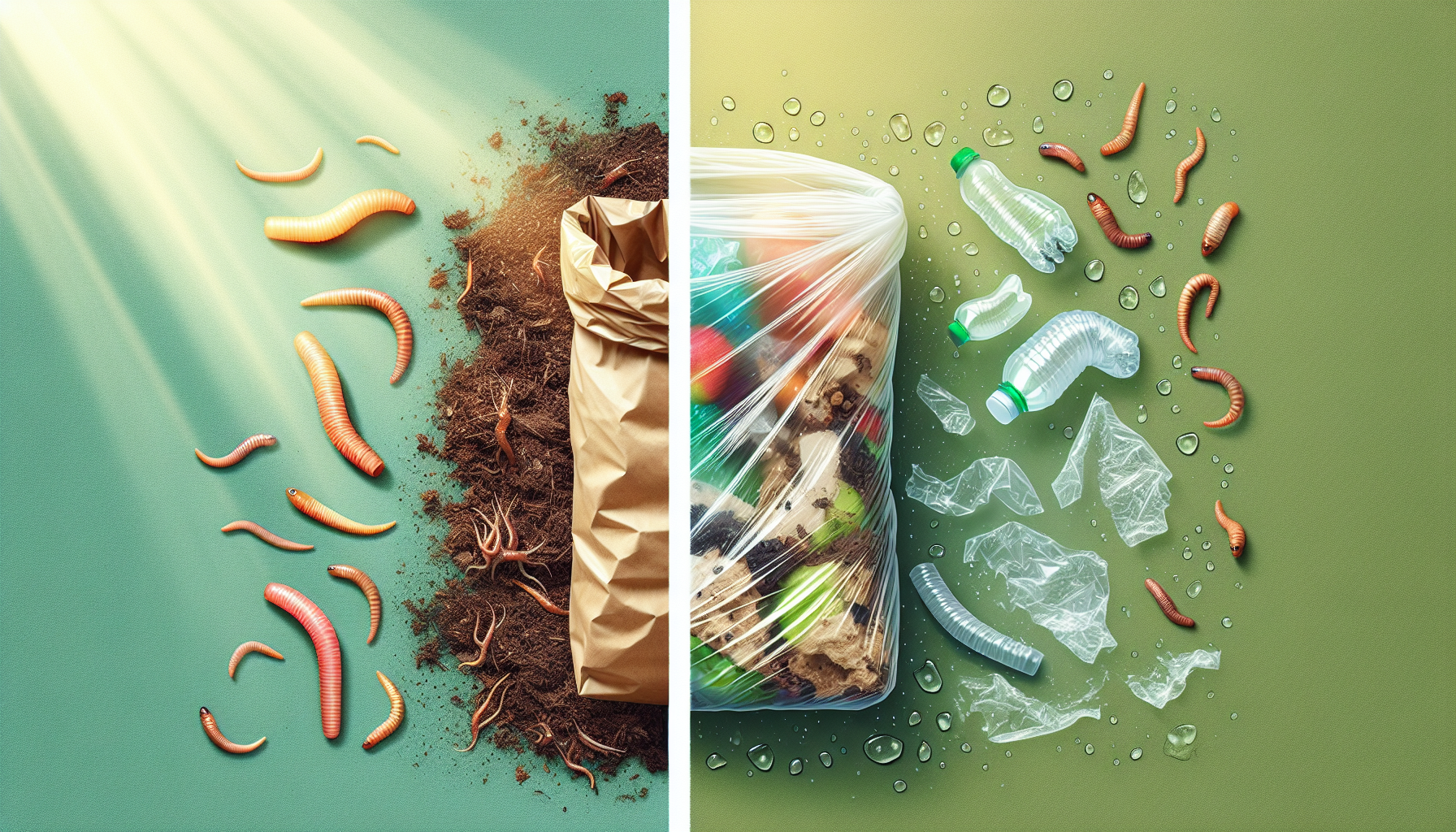
When it comes to eco-friendly trash bags, the terms ‘compostable’ and ‘biodegradable’ often make their way into the conversation. But what do these buzzwords really mean? Compostable trash bags are designed to degrade in composting environments, leaving a smaller environmental footprint when properly disposed. However, without access to commercial composting services, these bags might not degrade effectively. On the other hand, biodegradable trash bags are engineered to break down into nutrient-rich compost within a few months. But the effectiveness of both types greatly depends on disposal conditions and waste management facilities.
Understanding the distinctive traits and requirements of both compostable and biodegradable trash bags—eco-friendlier alternatives to traditional plastic bags—is a pivotal step towards making informed choices that align with our waste management strategies and environmental commitment.
Understanding Compostable Trash Bags
Compostable trash bags, also known as compostable garbage bags, are 100% plant-based, making them ideal for disposing of organic matter like kitchen food scraps or yard waste. These bags degrade efficiently in commercial compost facilities, usually within 180 days, but may not break down as effectively in home composting setups or landfills.
Realizing the full benefits of compostable bags necessitates their disposal at designated composting facilities and compliance with specific standards such as ASTM D6400 and BPI certifications. Their ecological effectiveness is intrinsically tied to the accessibility of suitable composting facilities.
The Reality of Biodegradable Trash Bags
Biodegradable trash bags, also known as biodegradable garbage bags, unlike their compostable counterparts, break down with the help of natural microorganisms, light, moisture, and time. They’re typically made from natural materials like cornstarch, designed to decompose rapidly without releasing toxic substances. To be appropriately certified, these bags should fully degrade within a year under the right conditions.
However, biodegradable bags sometimes only break down into microplastics, which can diminish their environmental benefits. Thicker biodegradable bags intended for heavier waste may not fully degrade in landfills due to insufficient environmental conditions required for decomposition.
Comparing Environmental Impact
Assessing the environmental impact of compostable and biodegradable trash bags necessitates a careful examination of their end-of-life outcomes. For instance, compostable bags like those from Green Paper Products decompose faster in composting facilities but do not break down efficiently in landfills. On the other hand, biodegradable bags like Tapix Lawn And Leafs Bags facilitate the breakdown of organic material into CO2, a more environmentally friendly process than methane release, a potent greenhouse gas.
Moreover, food scraps in compostable bags break down naturally, reducing the greenhouse gas impact. By supporting companies that prioritize environmentally responsible practices, we contribute to cleaner production methods and a reduced carbon footprint.
Leading the Pack: Top Eco-Friendly Trash Bag Options
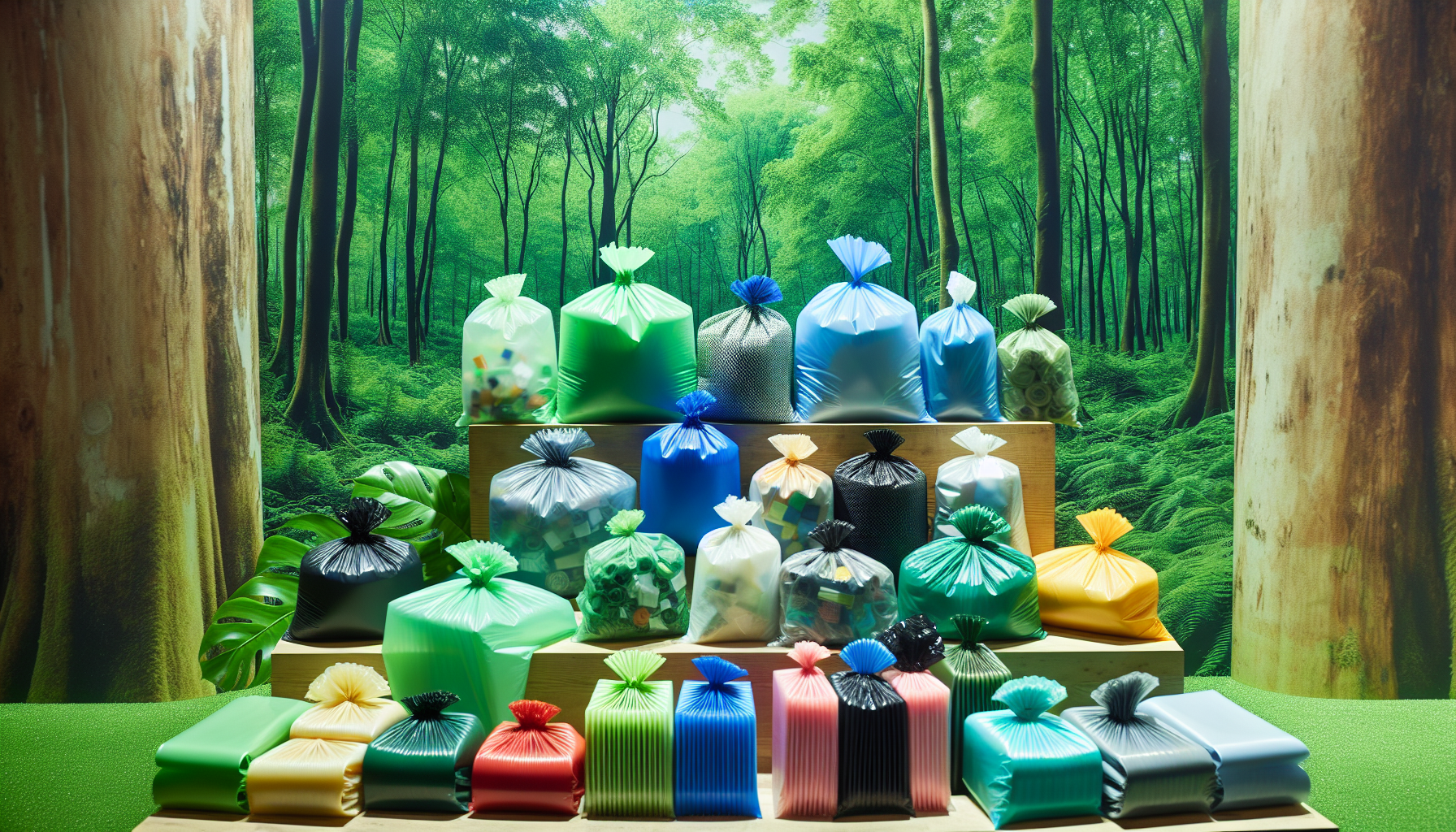
With the market for green garbage guardians growing, several brands stand out for their commitment to sustainability and practicality. These top eco-friendly trash bag options offer a blend of environmental responsibility, durability, and functionality, earning their place in the green hall of fame.
Among the leading brands are:
- UNNI 100% Compostable Bags, made chiefly from corn and plant starch
- HoldOn Large Trash Bags, composed of natural polymers derived from sugar and corn
- Green Earth Compostable Medium Kitchen Food Scrap Waste Bags, made from plant-based components
- BioBag The Original Compostable Bag, crafted from plant-based bioplastics like corn starch.
Championing Recycled Plastic Trash Bags
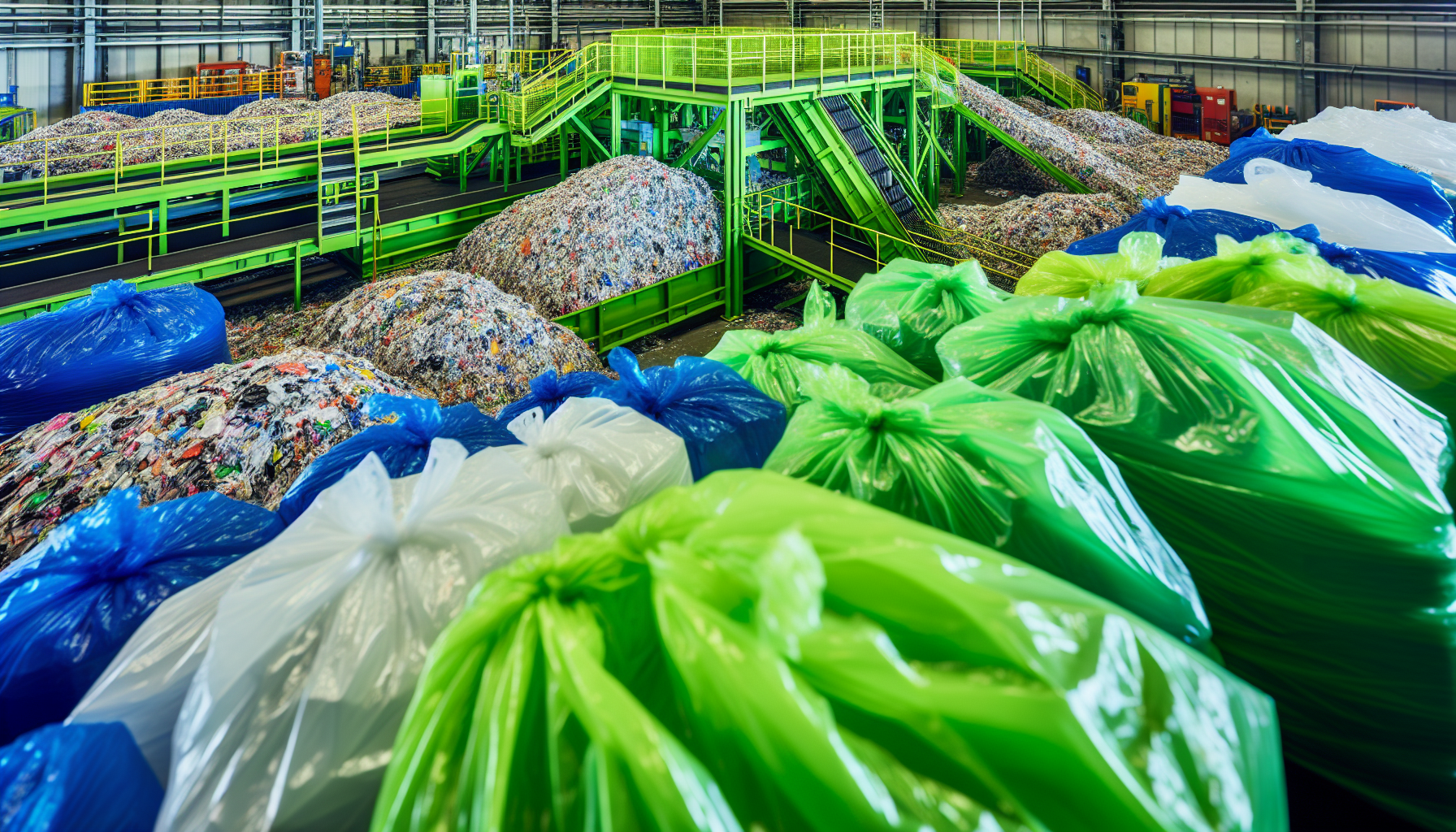
Using recycled plastic for trash bags is a stellar environmentally friendly option. It supports the growth of the plastic recycling market and contributes to a circular economy. Brands like Seventh Generation offer eco-friendly tall kitchen trash bags made of 100% recycled plastic with 70% post-consumer content.
Enpack’s Eco Renew Tall Kitchen TwistTie Kitchen Bags and Stout by Envision’s Total Recycled Content Plastic Trash Bags are also worth mentioning, both created with 100% recycled plastic. Selecting recycled plastic trash bags should involve checking the product certifications on packaging to confirm their recycled content.
Plant-Based Pioneers
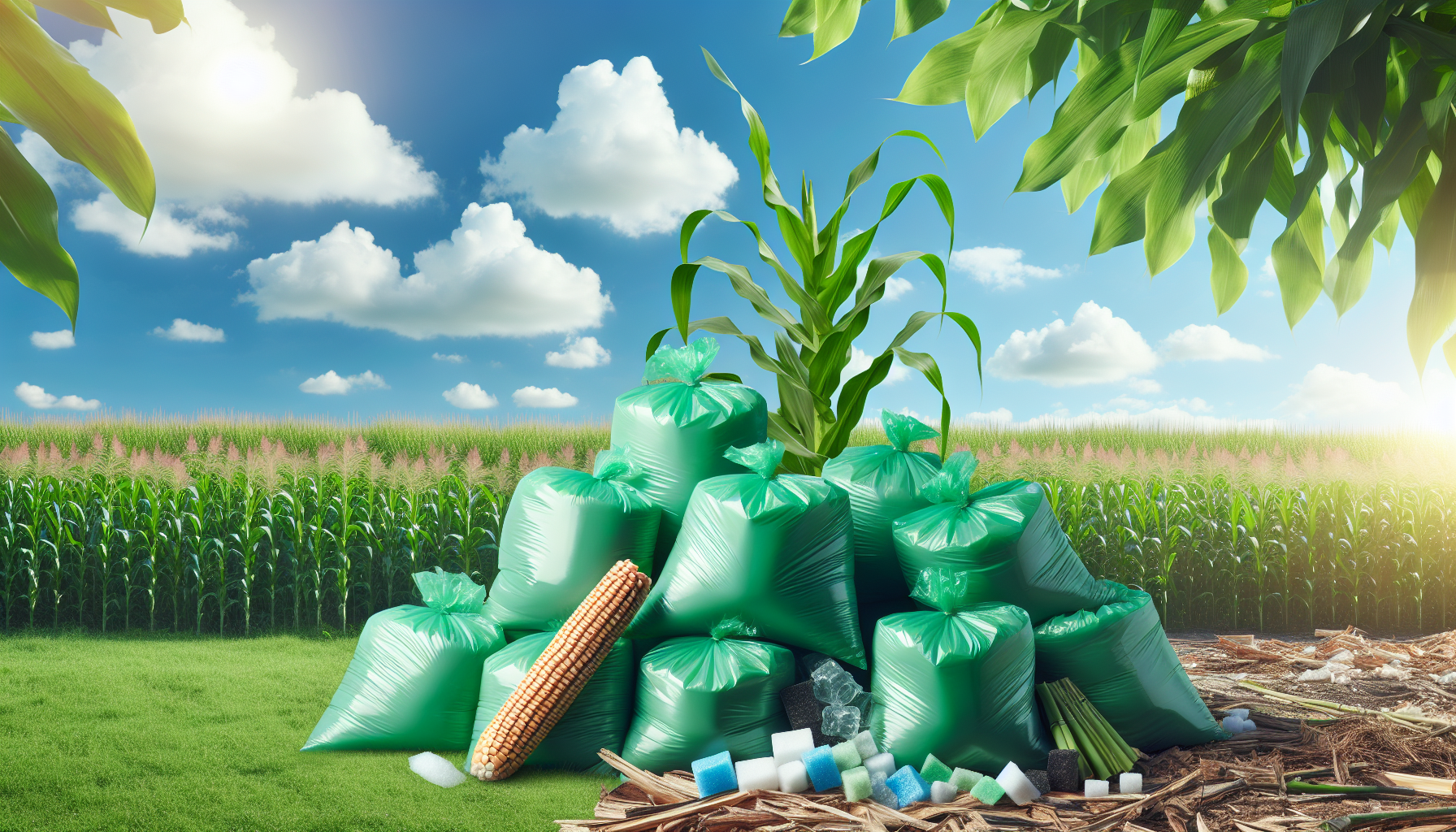
Plant-based trash bags are a game-changer in waste management. Using renewable materials like sugar cane, surplus crops, and corn starch reduces CO2 emissions and decreases dependency on fossil fuels. HoldOn Compostable Tall Kitchen Trash Bags, made with plant-based ingredients, are perfect examples.
NatureFlex cellophane bags by Vegware are another notable product, made from plant-based materials and offering compostability. These plant-based pioneers are leading the way in sustainable waste management solutions.
Paper Trailblazers
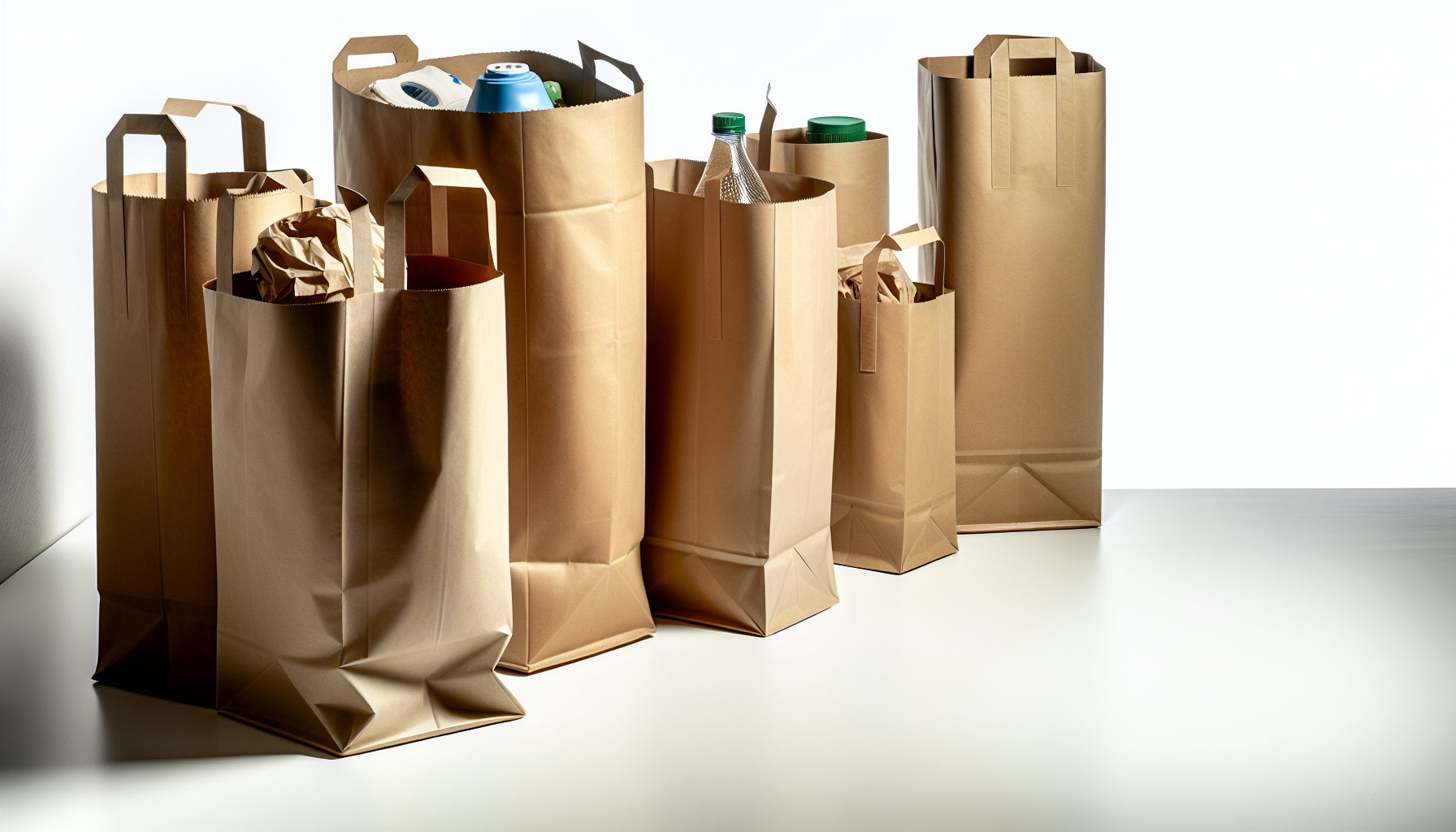
Paper grocery bags, when used as trash bags, offer an eco-friendly alternative with the following characteristics:
- Strong
- Reusable
- Recyclable
- Compostable
Lowe’s Heavy Duty Brown Paper Lawn & Refuse Bags showcase the durability of paper trash bags with their biodegradable, two-ply construction, suitable for yard waste.
Nevertheless, production of paper bags could be less environmentally friendly considering they require up to fourfold the energy used in manufacturing plastic bags.
DIY trash bags made from newspapers or craft paper also provide a sustainable choice for managing dry waste.
Zero Waste Warriors: Reusable Trash Bag Alternatives
Switching to reusable trash bags is a step towards a zero-waste lifestyle. These bags are:
- Washable and durable for multiple uses
- Promote sustainability
- Brands like Marley’s Monsters provide pail liners
- Brands like Teamoy and Alvababy offer reusable options for household rubbish that can be washed and reused many times.
Homeowners should check with local waste management services to see if they can forgo liners, further reducing waste and supporting zero-waste goals. For those interested in self-made solutions, DIY reusable green trash bags also provide a creative avenue toward a zero-waste lifestyle.
Navigating Certifications and Standards
Within the realm of eco-friendly trash bags, certifications and standards stand as critical instruments for validating environmental assertions and fostering consumer trust. The Biodegradable Products Institute (BPI) certification indicates that a product has been tested and meets all requirements for being truly biodegradable or compostable.
Biodegradable is often a vague marketing term without substantial backing, whereas compostable products are confirmed to degrade under specific conditions. Biodegradable and compostable bags, such as compostable bags, are certified to break down completely in commercial composting facilities, while biodegradable bags are not typically accepted due to potential contamination.
Trustworthy Labels
Third-party certifications play a crucial role in reducing consumer confusion and building trust by validating and certifying environmental claims of eco-friendly products against established standards. Eco-labels recognized by environmental standards include Type I for multiple attributes, Type II for a single attribute, and Type III for environmental product declarations, which are the most stringent.
Examples of certified environmentally friendly trash bags include Earthsense bags Certified Recycled Content by SCS Global Services and EvolutionBags, which are UL ECOLOGO certified and SCS Global Services Certified, demonstrating the practical application of such certifications. The Federal Trade Commission requires manufacturers to provide specific information about the timeframe and conditions under which their biodegradable products will decompose, ensuring transparent and accurate claims.
Standards Explained
The ASTM D6400 standard specification focuses on labeling plastics specifically intended for aerobic composting in municipal or industrial facilities. It outlines the criteria and guidelines for these compostable plastics to ensure their proper decomposition. For a product to meet this standard, it must disintegrate and biodegrade within 180 days in a compost setting, and the resulting compost must be ecologically non-toxic.
The biodegradable material used in environmentally friendly garbage bags often complies with the ASTM D6400 standard, indicating that it meets defined criteria for compostability. This standard is the recommended compostability test method, which is widely applicable to a diverse range of consumer products and industrial components, aiding in making credible compostability claims.
The Dark Side of Traditional Plastic Bags
While advocating for eco-friendly trash bags, understanding the environmental and health hazards linked with traditional plastic bags remains a necessity. These bags release microplastics that contaminate soil and water, posing risks to human health by being absorbed into crops or ingested directly. The accumulation of carcinogenic compounds released from plastic bags has potential links to cancerous diseases.
Marine animals are also at risk due to entanglement or ingestion of plastic bags, which can result in choking, starvation, or digestive blockages. The production of non-biodegradable traditional garbage bags has significant environmental implications, leading to long-term air and water pollution when broken down improperly.
How to Choose Your Green Garbage Guardian
Choosing the right eco-friendly trash bag involves considering its size, environmental impact, and practicality. Trash bags come in standard sizes such as:
- Small (4-6 gallons)
- Medium (8-10 gallons)
- Large (12-16 gallons)
- Extra-large (20-30 gallons)
These sizes accommodate different bin sizes from bathrooms to outdoor use.
Some factors to consider when choosing a trash bag include:
- Size: An oversized 13-gallon bag can accommodate more waste and prevent tears and spillage.
- Durability: Look for bags that are strong and resistant to tearing.
- Environmental impact: Consider options like biodegradable or recycled bags to minimize waste.
By considering these factors, you can choose a trash bag that offers better waste management efficiency and is more environmentally friendly.
Reducing Our Reliance: Tips for Minimizing Trash Bag Use
Even as we make greener choices in trash bags, it’s equally important to aim for waste reduction, especially when it comes to food waste. Creating less waste is more environmentally friendly than composting, which is still a better option than landfilling or incineration, according to the EPA’s Food Recovery Hierarchy.
Some ways to reduce plastic waste in your daily life include:
- Using reusable pail liners or lining bins with newspaper or scrap paper instead of plastic bin liners
- Adopting a ‘naked bin’ approach by foregoing liners and maintaining cleanliness through washing
- Practicing mindful purchasing to reduce waste
- Using reusable bags for picking up dog poop
By implementing these strategies, you can save money and move closer to a zero-waste lifestyle, which diminishes the need for trash bags.
Beyond the Bag: Wider Environmental Considerations
The impact of eco-friendly trash bags goes beyond the bag itself. When we support brands like GreenPolly Trash Bags, which utilize 80–90% post-consumer plastic and 10–20% bioplastic from sugarcane, or Grove Co.’s recycled trash bags, made from plastics destined for the landfill, we contribute to broader environmental considerations.
Our choice of trash bags influences ocean pollution, economic activities like tourism and fishing, and escalates the global environmental crisis due to increasing emissions and pollution. With an anticipated 40% surge in plastic production posing dire threats to oceanic health, climate stability, and air quality, the promotion of sustainable alternatives to plastic bags, such as those made from fabric, natural fibers, and paper, becomes pivotal in tackling these environmental challenges.
The Intersection of Ethics and Aesthetics in Trash Bags
Eco-friendly trash bags are not just about environmental responsibility; they’re about aesthetic appeal and functionality too. These bags are increasingly designed to be both aesthetically pleasing and functional, not compromising on environmental integrity. The desirability of eco-friendly trash bags is further enhanced by their ability to be used for various purposes beyond waste containment, signifying their multifunctional value.
The market appeal of eco-friendly trash bags is boosted by:
- Transparency around their environmental benefits and certifications
- Alignment with consumer values
- Practicality and convenience
- Reflecting our commitment to the planet
These bags are not just practical; they’re a lifestyle choice that reflects our commitment to the planet.
Summary
In conclusion, choosing the right eco-friendly trash bag is a multi-faceted decision that extends beyond just the product itself. It’s about understanding the difference between compostable and biodegradable bags, knowing the top eco-friendly options in the market, and being aware of certifications and standards. It’s about acknowledging the dark side of traditional plastic bags, reducing our reliance on trash bags, and considering wider environmental factors. But most importantly, it’s about making a conscious choice to protect our beautiful planet.
Frequently Asked Questions
What are the best garbage bags for the environment?
The best garbage bags for the environment are biodegradable and compostable, according to experts.
Which garbage bags are biodegradable?
The best biodegradable garbage bags for different uses can be found in this list.
Are BagUps really biodegradable?
Yes, BagUps are designed to be biodegradable and will decompose in 12-36 months with exposure to oxygen and sunlight.
What is the difference between compostable and biodegradable trash bags?
The difference between compostable and biodegradable trash bags is that compostable bags are meant for composting environments, while biodegradable bags break down with the help of natural microorganisms. However, their effectiveness depends on disposal conditions and waste management facilities.
Why are certifications and standards important for eco-friendly trash bags?
Certifications and standards are important for eco-friendly trash bags because they validate environmental claims, build consumer trust, and ensure the product is truly biodegradable or compostable.
You Might Also Like...











